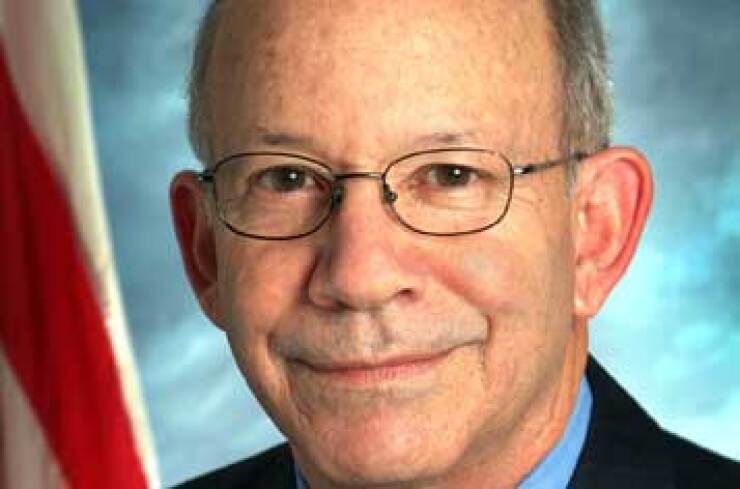
DALLAS — A proposal by an Oregon congressman to repeal the federal gasoline tax and instead support federal transportation spending with a refinery-based sales tax on oil is the latest idea to surface as Congress wrestles with a politically acceptable and economically feasible way to fund transportation spending.
The wholesale sales tax proposed by Rep. Peter DeFazio, D-Ore., would begin at $6.75 per 42-gallon barrel of oil. It would go up annually, he said, linked to improvements in vehicle per-gallon mileage and changes in the inflation rate.
"Let's repeal the retail gasoline tax at the pump, move it upstream, and let the oil companies pay it," DeFazio said at a Capitol Hill rally sponsored by highway construction and transportation groups. "We need to be number one in infrastructure again."
The tax on oil at the refinery would generate almost $35 billion a year, DeFazio said, which is about what federal gasoline and diesel taxes bring in annually. The tax would not be levied on oil for non-highway use, including aviation fuel and home heating oil, he said.
Current federal taxes of 18.4 cents per gallon of gasoline and 24.4 cents of diesel have lost much of their purchasing power because the taxes have been unchanged and not indexed for more than 20 years, DeFazio noted.
The House late Tuesday passed a 2015 spending bill for the Transportation Department that keeps federal highway funding at $40.3 billion, the same as in fiscal 2014 under the two-year surface transportation bill that expires Sept. 30. The House version must be reconciled with a similar but slightly more expensive budget measure passed June 5 by the Senate.
Neither bill outlines how to support federal highway and transit aid that annually exceeds trust fund tax revenue. That piece of the puzzle is the responsibility of the House Ways and Means Committee and the Senate Finance Committee.
Tax revenues dedicated to the fund bring in about $35 billion a year, while annual expenditures top $50 billion. Reimbursements to states for highway projects may be curtailed by late July due to a low cash balance in the Highway Trust Fund, the Department of Transportation has warned.
House Speaker John Boehner, R-Ohio, said Tuesday that using savings provided by cutting Saturday mail deliveries is the most viable solution to highway funding situation that does not involve a tax increase.
But House Majority Leader Eric Cantor, R-Va., who helped develop the postal plan and circulated a memo to House Republicans last week outlining reasons to support it, was unexpectedly defeated at Tuesday's state party primary election.
Senate leaders from both parties are backing a proposal to support the Highway Trust Fund by amending the corporate tax code to gain repatriated foreign earnings by U.S. corporations.
However, Senate Finance Committee chairman Sen. Ron Wyden, D-Ore., and ranking minority member Sen. Orrin Hatch, R-Utah, have said they intend to use those revenues for broader-based tax reform.
Senate Majority Leader Harry Reid, D-Nev., recently said he supported the repatriations plan but left the final decision to Wyden, Hatch and the finance committee.
"I am pushing everything I can to figure out a way to continue the surface transportation program," Reid said. "I've had people talk to me about repatriation, I've had them talk to me about gas tax. The ultimate decider on this, however, is going to be Ron Wyden and the finance committee."
Senate Minority Leader Mitch McConnell, R-Ky., told reporters after Tuesday's weekly Republican Senate luncheon that the repatriations proposal "enjoys a good deal of support in our conference."
Sen. Rand Paul, R-Ky., a potential candidate for president in 2016, said he supports a repatriation plan with a two- to three-year tax holiday. He said corporations could bring back foreign subsidy earnings at a 10% rate during the holiday to avoid the current 35% tax rate. Paul said the repatriation program would bring in up to $16 billion.
"We're running a chronic deficit in the Highway Trust Fund," Paul said. "This is a win-win, with a lower tax that brings in more revenue."
Deferring repatriation revenues in hopes of financing more comprehensive tax reform is a mirage, Paul said.
"Everybody says we want a grand bargain, that we want overall tax reform or nothing," he said. "I've been here for four years and we've gotten nothing. So I say we break this baby up into small pieces, do this on the transportation bill over three weeks, and have something that Republicans and Democrats both like."
Wyden said it would take $10 billion to keep the Highway Trust Fund solvent through calendar 2014, and another $8 billion to keep the fund afloat through the remainder of fiscal 2015.
The finance committee will develop a funding solution before the Fourth of July holiday, Wyden said, but right now all options are open.
"Nothing has been agreed to," he said. "Nothing has been ruled out, nothing has been ruled in. The goal is still to get it out of finance [committee] by the end of this work period."
Hatch rejects the use of the repatriated tax revenues for highway funding. He cited a report last week from the Joint Committee on Taxation that said a short-term tax holiday could cost the federal government almost $100 billion in lost revenue over the next 10 years. "A tax holiday meant to encourage U.S. companies to repatriate funds from overseas should only be considered when it makes economic sense, such as part of comprehensive tax reform," Hatch said.





